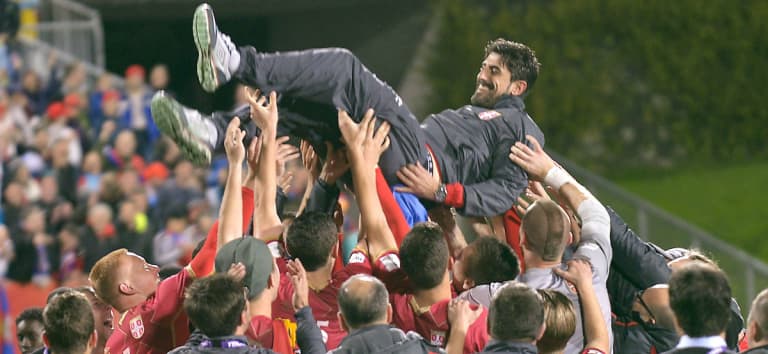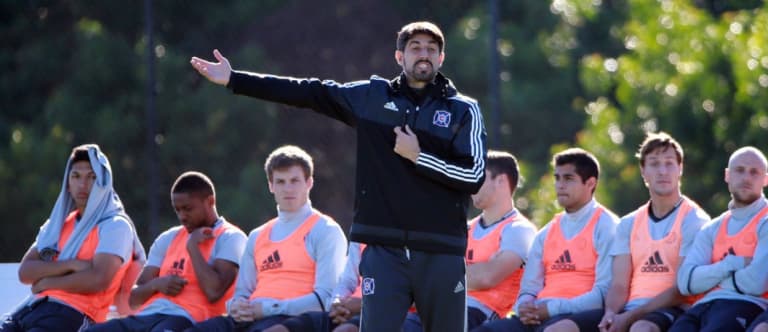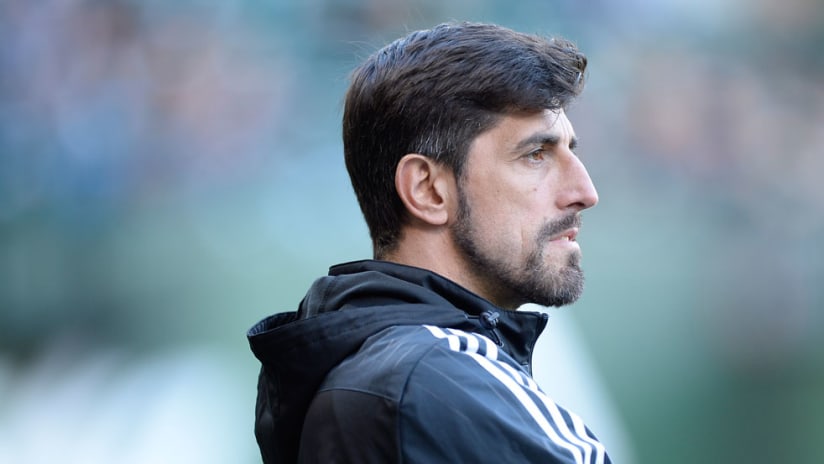CHICAGO – Milos Bajic couldn’t believe Chicago Fire head coach Veljko Paunovic was eating in his favorite restaurant, Café Beograd, in Chicago’s Irving Park neighborhood, when he walked in on a recent Sunday morning.
Bajic had played for Paunovic’s father Blagoje, a Serbian soccer legend, as a teenager, then followed Veljko’s heralded playing career, which began in his father’s footsteps at Belgrade giants Partizan before stops in Spain, Germany, Russia and the United States, and his subsequent move into coaching.
When Paunovic and Serbia’s Under-20 national team celebrated its World Cup title before an estimated 50,000 people at Republic Square in Belgrade last summer, Bajic had watched from afar, his heart swelling with pride.
“In Serbia, he’s so well known,” says Bajic, a Chicago-area youth coach. “Everybody knows him. Everybody respects him. Everybody thinks what he did with the U-20 national team was something amazing. It’s my honor to see him.”
It wasn’t the first time and likely won’t be the last time Paunovic is recognized by someone in Chicago’s sizable Serbian community, the largest in the United States. Once Paunovic glanced at Café Beograd’s menu and recognized familiar Serbian delicacies such as palacinke, a thin pancake similar to a crêpe, he quickly dialed Fire assistants Marko Mitrovic and Aleksandar Saric, both members of his Serbia U-20s staff, and summoned them to the restaurant.
Paunovic accepted an offer to become the Fire’s eighth head coach in November because of his belief in general manager Nelson Rodriguez, the club and Major League Soccer, where the former midfielder played the final season of his 17-year playing career with the Philadelphia Union in 2011. The fact that the comforts of home are easily accessible in Chicago are an added bonus.
“Chicago is what I was told,” Paunovic says. “I don’t know in terms of numbers, but I can see there’s a lot of Serbians. And I can see there’s a strong community, church, school, so it helps. It’s very helpful to know you have people from your country around you. But it’s also for me at the same moment, it’s a great responsibility for them, and I know that I’m representing them here too and our country. I understand that perfectly.”
What Paunovic and his U-20 World Cup team accomplished hadn’t been done since the breakup of Yugoslavia. After Serbia upset Brazil in the final in June, the celebration held for Paunovic’s team was the same as the one the country gave Novak Djokovic when he returned home from Wimbledon a champion in 2011.
Paunovic’s new mission is to bring similar success to the Fire, a proud club with a history of success which hasn’t finished higher than ninth place in the Eastern Conference the past two seasons, and made just one playoff appearance in the past six years. The 38-year-old certainly wants to make Chicago’s Serbian community proud, but more importantly, he wants to reward Fire fans for their loyalty.
“What I’m finding so far that the people are very passionate,” Paunovic says. “They want to win. They want a change. They want to see a different energy, different approach, style of play. Everything mixed with some sort of frustration. But what I’ve found in this couple of months working with the Fire is a hope.”
The first time he gathered his Serbian U-20 players and staff, Paunovic cued up a short highlight clip of Yugoslavia winning the U-20 World Cup in 1987.
When the video concluded, Paunovic told the group he expected them to do the same. At the time, the World Cup was three years away.
“He showed us that video, and he said this is what we’re going to achieve,” Mitrovic recalls. “We’re going to be the next World Cup champions. It’s not so easy to say we’re going to be the next World Cup champions, but I saw he knows how to do that. From the very first days, we trusted him. We just followed him. That was it.”
He may have exuded confidence, but there were plenty of reasons to question Paunovic’s ability to lead Serbia to unprecedented success.
While he enjoyed a long and fruitful playing career, which included nearly a decade at Atletico Madrid, his coaching career was just getting off the ground. The Serbian FA had taken a chance on a rookie coach, albeit an uncommonly ambitious one reared in the game from birth.
“It’s something maybe I can’t explain,” Paunovic says. “It was just there since I was born. It was there. Soccer was there. I was watching a lot of games, a lot of soccer, playing, training, lifestyle, taking care of my body, my mind, suffering. I’ve been cut many times, many times I was fighting for my spot in the team. Many times I was successful, too. That’s what it is. Soccer is life, concentrated in a game.”
Paunovic and his team grew together over those three years. He brought with him a philosophical foundation – a desire to play from the back in pursuit of attractive soccer – but he also learned on the job. He leaned on his staff for ideas and was willing to explore foreign concepts. He emphasized communication and positivity with his players. He never wavered from his confidence in the group.
“He has very good values,” Mitrovic says. “In soccer, you need to know all those things like tactics, technique, physical levels of players, how to improve that, but also these things that are very important for the mentality like enthusiasm. All those values are important. Pauno has that, and he knows how to share that with the players … He’s a different coach and big winner.”
If you spend any extended period of time around Paunovic and his assistants, you’ll hear the words "project" and "process" over and over. The teams they lead are projects, and the process is the journey from the starting point to wherever they end. They were unified in the project and the process leading up to the U-20 World Cup.
“I will describe that as an adventure,” Saric says. “From the first meeting to our last, until the final, the 20th of June 2015, we were one group and one team. We created that environment, one safe environment where everybody felt good. This is our biggest success: not only that we are successful, we’re enjoying the process. If you don’t enjoy what you’re doing, you’re spending energy. We didn’t spend our energy. We collected the energy.”
At the World Cup in New Zealand, Serbia knocked off Uruguay, Mali and Mexico in the group stages. They took down Hungary in overtime in the Round of 16, edged the United States in a penalty shootout in the quarterfinals, beat Mali again in overtime in the semifinals, then outlasted Brazil in in the final.
They returned to Belgrade as heroes.
“I don’t know the numbers, but on our road from the airport to the center of the city I think there was half a million people,” Mitrovic says. “They said this is the biggest success in Serbian sport ever. The people were very excited. They still speak about it. Soccer in Serbia is a culture; it’s a lifestyle. They said the second-most important thing in their life is soccer. That success means a lot to them.”
A World Cup winner before the age of 38, Paunovic was anointed a rising star in the coaching ranks.
“Not many coaches can say they won a World Cup, and Serbia is a proud country with a proud soccer heritage, but it’s still a small country,” Rodriguez says. “I think beating Brazil helps. It adds a cache.”
Paunovic had accomplished his mission; his project and his process had exceeded all expectations. He was immensely proud, but he wasn’t content.
“I don’t look back to it like, ‘Oh, yes.’ I think I have to learn and I have to improve more,” he says. “That’s what makes me happy – the opportunity I can work more and have more opportunities and improve.”

Sometime in the 1990s, Nelson Rodriguez began keeping notes on people who impressed him.
It could be a coach, marketing executive or chance encounter. If he found himself walking away from a conversation feeling he’d just met someone unique, Rodriguez would jot that person’s name down on an index card and file it away.
Six years ago, Veljko Paunovic made it into the then-MLS executive’s Rolodex.
Prior to joining the Union in 2011, Paunovic had explored signing with a MLS team in 2010, but the move didn’t fall into place. Rodriguez requested an audience with Paunovic anyway.
“I was sensitive to someone who had played 10 years in La Liga and [might] return to Europe and return to Spain with a negative perception of MLS,” Rodriguez remembers. “He was gracious enough to give me the time, and we spent a considerable amount of time talking about the league and where it was in its evolution, why I hoped he could understand that the situation transpired in the manner in which it did.
“[I noticed] his grace, his humility, his willingness to listen, his willingness to accept it, his willingness to come back and try and see if it was as I said or if it was different. He ended up having a fantastic experience with Philadelphia.”
Rodriguez kept in touch with Paunovic over the years, and the two even exchanged texts prior to the U-20 World Cup last June. When Rodriguez was hired to be the Fire’s general manager in October, he didn’t hesitate to include Paunovic on another important list.
Rodriguez designed a grading system with 11 criteria when he interviewed potential coaches. Paunovic scored well. Above everything else, Paunovic’s ability to teach received high marks.
“I think he has a keen eye for nuance and he has the ability to modify behavior positively,” Rodriguez explains. “Those are key teaching elements. Level of involvement and intensity, there’s no detail that is too small for him, that should be overlooked or ignored. He is infectiously enthusiastic, which I think is very important, proactive and inquisitive. He’s constantly searching for a better way, and he’s willing to have himself be challenged and opened up examination so that he can improve.”
Paunovic had his own list of criteria. He sought a “project” where he could work with good people, have time to build a team and focus on the physical, technical, tactical and mental aspects required to implement his preferred style. He believed the Fire offered that opportunity. He also clicked with Rodriguez and thought highly of MLS.
“The environment is what we need,” says Paunovic. “I think that’s very important. And it’s a league that’s doing great. I think it is in expansion. I think it’s doing things right and doing the right things, as Nelson likes to say. I have time to build a team, time to work in the preseason. I think everything is there.”

Rodriguez is already preparing to say goodbye to Paunovic.
If the young coach does what Rodriguez expects him to in Chicago, bigger clubs will come calling. And that’s just fine with his boss.
“If he does leave, it will be because we were successful,” Rodriguez says. “At a club that is starved for on-field success, that’s massive upside. If he can set a new foundation from which we can continue to grow, if and when he leaves, that would be another upside. I don’t see the downside. By the way, while I believe other teams will come calling, it doesn’t mean he has to say yes.”
Count Chicago midfielder Razvan Cocis among those who have a good feeling about Paunovic, who has a knack for eye-opening first impressions. He made a strong one with Rodriguez, did the same with the Serbian U-20s and quickly earned the respect of the Fire.
“He counts on the power of the group. He tries to implement in us like a winning motivation,” Cocis says. “He wants us to think we can be winners. I also like the idea of his tactics. After we’ve done some things about this, some video, then he explains what he wants from us offensively, defensively. I’ve seen games and I look different ways to the games.”
Paunovic and Rodriguez aren’t out to completely sugarcoat the season ahead. They both realize there are likely to be some bumps in the road. They have asked for patience.
But Paunovic isn’t afraid of what lies ahead. He learned from his father, who passed away in 2014 after dedicating more than half a century to the game as a player and coach, that good can come even from the toughest of times.
“He was always there, always very passionate about soccer,” Paunovic says. “He will always talk about how we can improve the game, how we can improve the team, how we can improve the player. I have the same feeling now. That’s what I’m doing, I believe.
“To all the players I interact with, I try to spread that passion, that love for the soccer. Not just when things are good, also when things are not as we want them to be. But I always try to say, if you have faith, you will learn from this situation and you will be better in the future. If you just think soccer is good when things are going good, you’re wrong. Because soccer is good even when you’re not going good. That is the great opportunity and great test for you in order to prove you love this game.”













